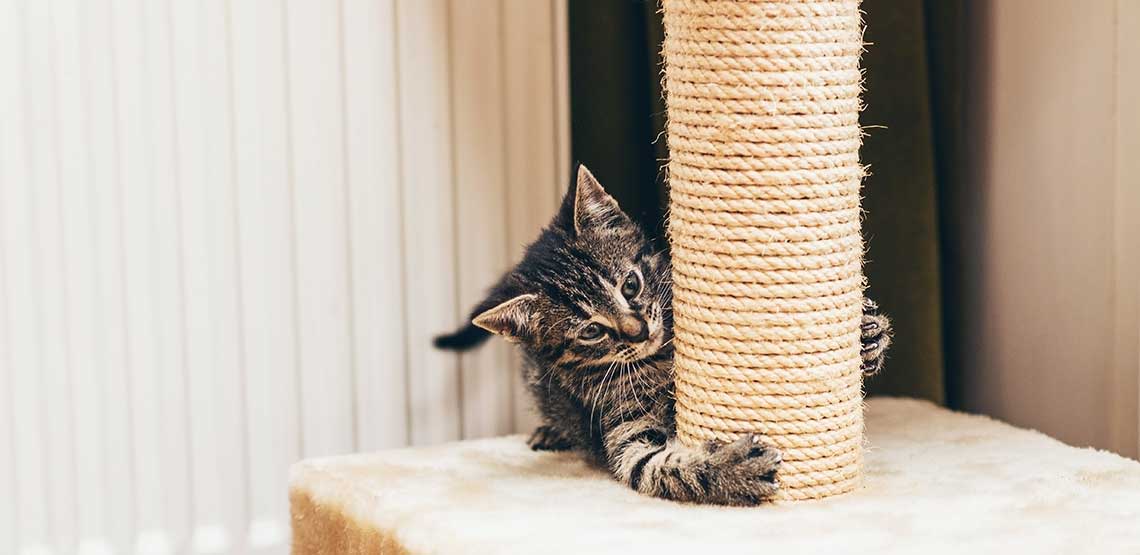Why Do Cats Scratch?
Cats will often scratch and damage items that we love. We’ve all experienced the anguish and frustration of it: the new carpet, the furniture, cabinet doors, bookshelves, the cedar deck, the newly planted young trees. You name it, and a cat will try to get its claws on it. But what is it that drives our feline friends to scratch up our valuable stuff?
Is it a mischievous need to punish us? Is it some sort of evil cat logic to get even with us for accidentally stepping on their tails? No, it’s nothing of the sort; it’s just cats being cats. If you still find yourself asking, "why do cats scratch?" read on to learn more.
Reasons Why Cats Scratch
There are many reasons as to why your cat might start scratching away at things. While it can be annoying to have your favorite chair ripped up, there are reasons for this behavior. Let's take a look at some common causes.
Shedding Dead Claw Husks
Cat claws are constantly growing. That means the outer covering (the husk) dies off and has to be shed so the new, healthy claw can replace it. As a snake must periodically shed its old skin for new, cats also shed their old outer claws for new, healthy ones. Scratching hard or textured surfaces is simply a fundamental part of a cat’s natural grooming habits.
Grooming
Cats are fastidious groomers. They can’t stand to be unkempt or unclean. Scratching surfaces they are attracted to is a part of their constant preening and grooming process.
Stretching
Cats love to stretch. They stretch for the same reasons we do: it feels good. Plus, it’s healthy for their muscles, joints, and blood circulation. Cats love stretching their legs, feet, and claws, especially when they just wake from a sunny window nap or a deep sleep. Working their claws into a carpet or other enticing surface is a big part of their stretching ritual.
Marking Territory
All cats, wild and domestic, are territorial creatures. In the wild a big cat may scratch a favorite tree, a log, a mossy patch, or even a large rock to mark their territory. Pet cats do the same thing, but instead of having a log handy in the house, they will improvise―your furniture becomes their log, your carpet is their moss. By the way, that fancy potted palm in the living room is a tempting tree that no cat can resist!
Being Angry, Nervous, or Frustrated
When cats get antsy they will go into a scratching frenzy. We’ve all seen cats do this. They will dart around the house in a crazy, manic storm. They will hiss, meow, screech, and growl when they are annoyed or feel threatened. They will also scratch anything within reach to relieve some of that nervous tension.
Being Happy or Excited
Like the high anxiety scratching mentioned above, cats will also scratch when they are happy or excited about something. It could be anything like a treat, meal time, or you when walk through the door.
You May Also Like:
Related Search Topics (Ads):
How to Minimize Scratching
Now that you have a clearer appreciation for why cats scratch, here are some practical things you can do to minimize the problem. Just remember, whatever you do, don't declaw your cat. That is a cruel, painful, and barbaric treatment. Imagine, if you will, having your own finger and toe nails yanked out . . . enough said.
You can begin by buying several good scratching posts to strategically place around the house. These should be tall and sturdy enough to allow the cat to stretch, scratch, and climb. The posts should be covered with carpeting, sisal rope, or both. The multi-level posts and cat condos are also great, especially for multiple cat homes. Corrugated cardboard scratchers are also good, but they aren’t designed for climbing or playing on. Cats can use the scratching boards with cat condos or posts, but not in lieu of them.
One scratching post for each room the cat has access to is usually good enough. You can also place two or more in large rooms, or rooms with a lot of furniture or carpeting. Pay special attention to where the cat likes to perch or nap, such as in sunny windows or on high shelves. Your cat will want a good stretch and scratch upon waking, so the location of the post is key.
You can also positively reward and encourage your cat when it uses the scratching posts and boards. However, never use negative punishments when the cat does the wrong thing. With your anger in check, simply correct the cat’s behavior by picking it up and placing it on or near the scratching post. Reward it with lots of positive praise and maybe a small treat. Your cat should feel good about using the scratching device. It should never be made to feel afraid or intimidated by you.
Key Takeaways
Cats instinctively scratch things for several good and natural reasons. It is not about you so take it in your stride. If you’re going to be a happy and successful cat parent, then you have to know why they scratch. Once you understand the reasons then you should take proper action to train them and minimize or avoid the damage.

